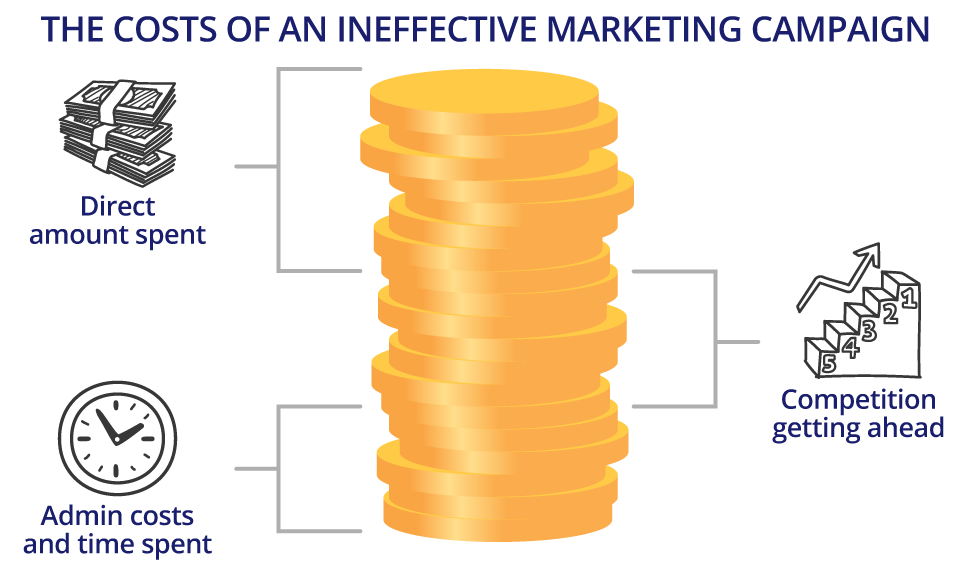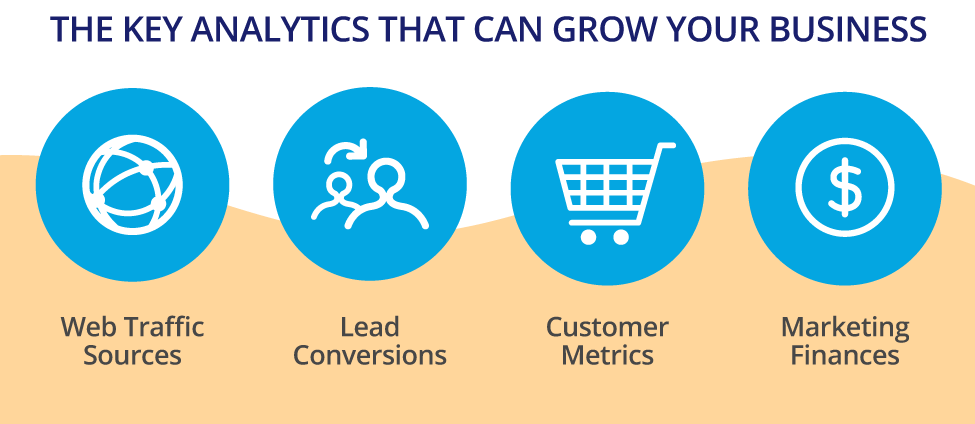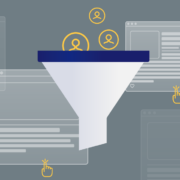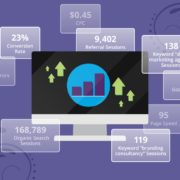How Marketing Analytics Can Make or Break Your Campaign

Your business wouldn’t make an investment without a way to measure success, so why should digital marketing be different? Marketing analytics are key to determining the success of any campaign.
Organizations of all kinds rely on key performance indicators (KPIs) to judge the success or failure of their decisions. These metrics are widespread throughout sales, manufacturing, distribution, customer service and the other important areas that contribute to a company’s success. If your business isn’t taking a similarly methodical approach to marketing analytics, it could fall behind.
The potential cost of not capturing marketing analytics
Marketing KPIs and other insights provide leaders with the information they need to make effective decisions. The metrics assist decision-makers in planning, strategizing, assessing and evaluating a marketing program. Without access to current, accurate and actionable information, companies are essentially flying blind.
The financial loss to a company as a result of paying for an ineffective marketing campaign is the most direct impact of not having reliable information. Deloitte’s CMO Survey revealed that major companies spend between 10.1 and 17.7 percent of their overall budgets on marketing. For startups in some industries, this is as much as 40%. Can your company afford to pay this much without knowing whether you’re seeing a return on your investment?

The direct cost is only one factor out of many. Your company invests time and administrative resources into managing the marketing team. The longer your company goes without metrics that signal a failed campaign, the more time and money you lose on propping it up.
Once your brand recognizes a failed campaign, it will still be at a considerable disadvantage. While your company’s been falling behind, your competitors’ successful campaigns have increased the gap between you. Marketing analytics deliver a clear competitive advantage that your company needs to remain relevant.
How your company benefits from marketing metrics
Failing to take advantage of marketing KPIs allows other companies to pull ahead while your brand stagnates. However, these metrics aren’t just about avoiding negative consequences. Ensuring reliable access to accurate marketing KPIs provides businesses with the information they need to thrive and grow.
Marketing metrics are an essential form of feedback. They tell marketers what works and what doesn’t. This lets decision-makers hone their targets, adjusting as needed. Metrics are the foundation of a continuous improvement approach, allowing businesses to remain agile and adaptive to change.
Digital marketing analytics, in particular, highlights which approaches are most effective. A brand’s unique customer base responds differently to each piece of the many types of digital marketing. Brands that identify the most effective strategies can choose to focus on those areas and increase the ROI of their marketing spend.
Furthermore, these metrics provide a way for companies to better understand their customer base and those who engage with their brand. The digital world enables brands to create more complex customer experiences. Understanding the customer journey and the channels that journey connects to provides companies with even more opportunities for improvement.
A company that knows its customers will meet their needs more effectively. In digital marketing, that means more accurately targeting campaigns and efforts to generate leads and close sales. That simply isn’t possible without the benefit of accurate marketing metrics.
The key marketing analytics that help grow your business
Every business must contend with the challenge of identifying and defining effective KPIs. It’s not enough to simply measure everything that can be measured. Instead, companies need to know which metrics actually translate to improvements in their bottom line.
Choosing the right analytical approach has a considerable impact on the success of any marketing effort. Research from global management consulting firm McKinsey & Company shows that analytics alone can account for 15 to 20 percent of a company’s marketing spend. With so many resources devoted to analytics, companies need to know they’re committing those resources effectively.

Web traffic sources
When it comes to digital marketing, some of the most important metrics concern web traffic sources. These KPIs tell a company how visitors reach their website and their referral sources.
In general, web traffic source metrics let businesses know what percentage of visitors are coming from:
- Direct traffic where the visitor types the website directly into the browser
- Referral traffic where visitors reach the website by clicking a link on another website
- Organic search traffic where visitors find the website through Google or other search engines
- Paid campaign traffic that comes from pay-per-click advertising and promoted content
Tracking this data means you can connect a specific digital marketing campaign to your overall website traffic. For example, businesses know whether visitors arrive from affiliate links, social media, pay-per-click advertising or other marketing efforts. In addition, companies can more effectively craft a customer experience by distinguishing whether visitors are using a desktop or mobile device.
Lead conversions
Driving visitors to a company’s website is just one part of a successful digital marketing campaign. Knowing how many of those visitors are converted to leads and sales is the true marker of success.
For B2B companies, a lead is very distinct from a website visitor. Incredibly high website traffic is of little value unless those visitors are potential customers. The traffic conversion rate is a metric that shows how many visitors become leads by reaching out to a business for a consultation or sales demo.
Businesses need further insight into how many leads turn into sales. This is the lead conversion rate. While these metrics provide insight into performance, they also require additional data connecting them to specific campaigns.
The success of a specific campaign can be evaluated with the following metrics:
- The bounce rate shows how many visitors arrive from a campaign only to leave the landing page without navigating further
- The first visit metric that shows the referral source for unique users’ first visits to the website
- The end action rate that shows the last interactions with visitors from specific campaigns, whether they are sales, leads or bounces
- The online conversion metric that shows the number of conversions per click for any campaign
These marketing analytics provide a closer look at how visitors from different campaigns interact with a business. A company can use them to determine which campaigns bring valuable visitors who could become paying customers.
Customer metrics
Gauging the direct impact of marketing campaigns is important, but so is understanding what customers want. Marketing KPIs also provide insight into how customers see a brand and what defines its audience. This information helps develop more effective marketing strategies.
To achieve a better understanding of their customers, a company should monitor KPIs like:
- The brand awareness metric that tracks brand sentiment (how people feel about the brand) across social media, search engines and referring links
- The newsletter signup conversion rate, which identifies how many customers are engaging with the business through their newsletter
- The customer attrition metric that shows the rate at which customers end their relationship with a company
- The customer share by category metric that breaks the customer base into categories like business size, industry or other criteria
- The net promoter score, which gauges willingness to recommend products or services to colleagues
Understanding the needs of any customer base can be a considerable challenge. Many customer needs aren’t easily quantifiable. These metrics let businesses put concrete numbers on the board so they can make effective decisions.
Marketing finances
Marketing in itself is not responsible for the success or failure of a company. Product quality, market fit, customer service, pricing, brand value, executive leadership and other factors influence a business’s potential and success. However, the cost versus revenue of specific marketing campaigns can be measured. So how does marketing campaign performance translate into an objective financial assessment? There are many marketing analytics that break down the bottom line of a campaign to let a business make objective decisions regarding marketing costs.
Return on investment (ROI) is the fundamental KPI in this area. ROI shows a company’s percent profit or loss through a marketing campaign. However, ROI is generally more suitable for planning and assessment after the fact. Therefore, businesses need additional metrics to evaluate ongoing campaigns.
To gain a better understanding of the costs and revenue associated with a campaign, businesses use marketing metrics such as:
- The cost per lead that measures the average cost incurred by a campaign to generate a lead
- The customer acquisition cost that measures the cost for a campaign to convert one paying customer
- The customer lifetime value metric, which shows the average gross profit expected from one customer
By evaluating these metrics for different campaigns, marketers understand where money is most effectively spent and where a campaign can be adjusted for a better ROI.
Marketing analytics isn’t a one-time thing
Businesses can’t expect to succeed if they treat analytics as a one-time thing. Across every industry, analytics play an ongoing role in maintaining and improving operations. Digital marketing is an ongoing journey that helps build your brand. Therefore, a business needs to continuously track and evaluate marketing analytics to accelerate their brand success.
Some businesses choose to rely on services that provide a snapshot of marketing metrics rather than working with a marketing partner. However, this isn’t a practical approach. Like other KPIs, marketing metrics are most valuable for identifying trends.
Identifying trends requires continuous monitoring and tracking across a wide range of metrics. Understanding these trends lets your marketing partner plan their marketing strategies more effectively and reduces the chance of drawing incorrect conclusions from data.
Most importantly, having a wealth of digital marketing data provides marketers with the best possible foundation for future campaigns. With more insight into what works and what doesn’t, they can ensure that their next campaign is set up for success rather than blindly hoping for it.
Why your brand should work with a marketing agency
New tools emerge daily to help an organization manage its marketing analytics. However, this doesn’t mean that going it alone is the best option. Working with a marketing agency puts your brand’s marketing in the hands of professionals who can extract the maximum benefit from your marketing spend.
A professional marketing agency ensures that metrics are captured and analyzed. They have the experience and insight to identify which metrics are most relevant to any given business or marketing campaign. This allows businesses to spend more time on what they do best while leaving these details to professionals who know how to handle them more effectively.
A marketing agency provides a comprehensive approach. Brands have access to a full range of metrics, including analytics regarding website traffic, social media, customer engagement and more. Many of these metrics can’t be measured accurately or reliably without the tools and experience that a marketing agency brings to the table.
The unique insight of a marketing agency also provides access to a broader range of analytics. While every company might understand ROI or lead conversion, other digital marketing metrics aren’t so intuitive. A digital marketing agency captures, evaluates and helps businesses understand additional metrics like:
- Social media likes, shares and followers
- Post, email and content opens
- Lead scores
- Search keyword rankings
- Time on page
- Readers and finishers
As with any other investment, businesses need to weigh the pros and cons of going with an agency or handling it in-house. However, in the case of digital marketing, it’s generally best left to the professionals.
Mindspin sets your brand up for success
Mindspin provides comprehensive digital marketing services for businesses. We develop brands, create campaigns, design and maintain websites, and handle everything related to marketing strategy. That includes defining, measuring, monitoring, tracking and evaluating digital marketing analytics.
We get to know your brand and customers, which shows in our reporting with clear, accurate and reliable analytics. That means better results from digital marketing efforts.
Contact Mindspin today to prepare your brand for the best possible foundation for growth with our marketing analytics and agency services.
Tanja Groos, Founder and Director, Mindspin® Studio Inc.
Tanja Groos is a Founder and Strategy Director with more than 25 years of experience in branding and digital marketing. She has a strong background in developing and implementing marketing strategies, gained from collaborating with leaders and managers in consultative and service-based industries. Her efforts have tripled sales, surpassed top industry competitors online, and enhanced brand credibility for her clients.
Tanja’s award-winning branding work and marketing insights have been featured in national showcases and publications like “The Hamilton Spectator” and “Identity Solutions.” She received the Entrepreneurial Recognition Award from the Government of Canada. Tanja is passionate about helping people connect with services that enhance their lives and guiding readers in achieving their business growth dreams by explaining how marketing gets them there.
Follow Tanja on LinkedIn












